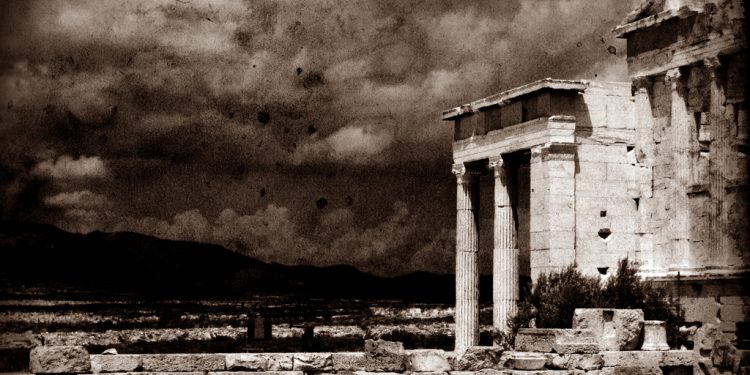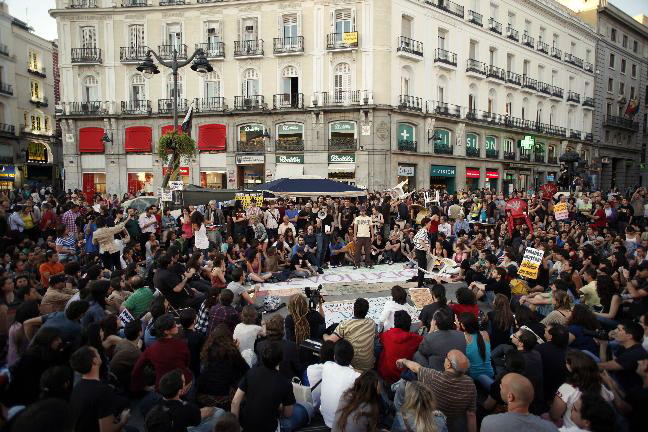By Yavor Tarinski
Ecology was of great interest for Castoriadis, one of the great philosophers of the 20th century. In his later writings, Castoriadis incorporated ecology into his political project of autonomy, based on direct democracy. For Castoriadis ecology is political because it raises the fundamental question of our purpose in this world and of limiting ourselves in relation to one another and the world we have come to inhabit.

Cornelius Castoriadis (1992-1997) . Source: reporterre
Ecology played a major role in the thought of Cornelius Castoriadis. Castoriadis viewed ecology in stark contrast from most environmentalists, now and then. Like political ecologists and the readers of this blog, he insisted that nature is not a commodity, and should not be seen as something separated from society. For Castoriadis, nature was integral to his, and anyone’s, political project.
Despite his criticism of the inability of the leading environmental organizations to overcome the imaginary of capitalism and political representation, Castoriadis recognized in the ecological movement certain evolution in the field on which challenges, contestations, revolts and revolutions are taking place (The Castoriadis Reader, p.246). According to him this evolution takes part in two dimensions: in the instillation of schemes of authority on the one hand; and in the instillation of schemes of needs on the other. The former is exemplified by the workers’ movement while the latter, by the ecological.
Unlike class-centered analyzes, Castoriadis saw in the 19th and 20th century workers’ movement not simply an attempt at reshaping the economic sphere, but a direct-democratic challenge to domination and authority. As he put it:
What the workers’ movement attacked above all was the dimension of authority – that is to say, domination, which is its ‘objective’ side. Even on this point it left in the shadows – as was almost inevitable at the time – some completely decisive aspects of the problem of authority and domination, therefore also political problems concerning the reconstruction of an autonomous society. Some of these aspects were put into question later on, and especially, more recently, by the women’s movement and the youth movement, both of which attacked the schemata, the figures, and the relations of authority as these existed in other spheres of social life.
For Castoriadis, the ecological movement contributed another dimension to the struggle against capitalist modernity: it put into question the very structure and nature of human needs, the styles and modes of living. Ecology constituted a breakthrough in comparison with the unilateral character of previous movements. It challenged the entire relationship between humanity and it environment, raising the eternal question of what is the human place in this world.

Cornelius Castoriadis, A Society Adrift (2010, Fordham University Press)
Unlike many of his contemporaries, Castoriadis disagreed with the idea that ecology is one more scientific branch. He insisted that ecology is political. Ecology, he argued, is humanity’s relationship with nature and the limitations in the relationships between the two. Ecology cannot be scientific, since science is not about setting limits before its goals but about discovering ways of achieving them. Castoriadis was not afraid of science or technology – he saw for example the importance of mobilizing research and science to explore the impact of our activities on the environment. But he argued that only through political deliberation one can determine what should and shouldn’t be done, what is “wrong” or “right”, and to what extent we can alter the planetary conditions.
His logic counters the belief that through technology and science humanity can master the world. This technocratic view, Castoriadis argued, has become our contemporary religion. Techno-science reinforces ideological mystification in a time in which authority has become ostensibly desacralized. If in the past the power of the ruling elites was explained through its divine God-given origin, today it rests on the scientific knowledge that they claim to posses, and allows them to continue their destructive activities. Technology, Castoriadis argued, cannot be viewed as neutral, since it has been developed and shaped by capitalism and has embedded its values of domination and subordination.
Like religious regimes, contemporary technocracies claim to know what the people actually need. They purport to calculate this using science and deliver it through economic growth. But what they actually do is to express the needs, embedded in one specific imaginary. In reality there are no predetermined human needs, Castoriadis claimed. Every society creates its needs and the means for their satisfaction. For a religious devotee the ultimate need is to make a pilgrimage to a holly site, and she might spend all her savings for this. For the anthropological type of capitalism the need to constantly replace his belongings and gadgets with new ones is likewise unquestionable and natural. A system functions well if it keeps providing the means for the satisfaction of the needs it fabricates. The current paradigm, Castoriadis argued, may be less threatened by ideological criticism, than from the danger of running out of resources.

Erechtheion, Acropolis of Athens © Nikos Niotis | Source: Flickr
Castoriadis took issue with the absence of prudence and the inability of our societies to take precautions when transforming the world. If scientific research cannot determine with certainty whether something harms the environment irreversibly, then precautionary limitations should be established with a political, direct-democratic process, he argued. Ecology therefore is incompatible with the current representative oligarchic political system that hinders genuine and direct democratic deliberation. Ecology is then part of wider revolutionary project, that of direct democracy, which directly challenges the contemporary institutional order. As Castoriadis suggested in The Rising Tide of Insignificancy:
…profound changes must take place in the psychosocial organization of Western man, in his attitude toward life, in short, in his imaginary. The idea that the sole goal of life is to produce and to consume more—an idea that is both absurd and degrading—must be abandoned; the capitalist imaginary of pseudorational pseudomastery, of unlimited expansion, must be abandoned. That is something only men and women can do. A single individual, or one organization, can, at best, only prepare, criticize, incite, sketch out possible orientations.
Just as contemporary techno-science has become sacralized, however, so too ecological thinking can evolve into a new religious cult or neo-fascist ideological project. The Nazis turned human health into a dogma that led to the extermination of thousands of people with disabilities. Faced with environmental catastrophe, one can imagine the birth of an authoritarian regime that will impose draconian restrictions in the name of preserving nature. Hence Castoriadis proposes to integrate ecology into a political project that goes beyond narrow concerns for nature. Such politics will not be based on romantic, mystic notions of the love for Mother Gaia or the superiority of pristine nature over technology and science. Instead, it will take into account the balance between humanity and the planet, without glorifying the one and diminishing the other. Ecological politics should recognize that for the continuation of our species, we do not have to abandon technology and science, but find out a position within the fragile planetary conditions.
Because we depend on nature, ecology cannot be separated from direct democracy. In the matter of our common future all of the social collectivity should have a say. The specific, technical way in which such decisions will be taken is of less importance than the principle. Everybody should be asked whether they want to saw off the branch of the tree they are currently sitting on.

Direct democracy is not utopia, but needs to be coupled with ecological thinking. Source: Libcom
The concept of self-limitation is central when discussing Castoriadis’s political ecology. The current environmental crisis is man-made – the greatest danger for humanity is humanity itself. No natural catastrophe equals the man-made catastrophes. Our societies continue to follow the paradigm of unlimited economic growth, insisting on a lifestyle that simply cannot be sustained by the finite world we live in.
Self-limitation means that there is no one that will protect us from ourselves. Political leaders cannot solve environmental problems alone and neither will individual, life-style changes like shorter showers, turning off the lights or the eco-friendly products that boost our egos and self-esteem, making us feel we did our part. Self-limitation reminds us of our individual and social responsibility before ourselves, our fellow human beings and the rest of the natural world that surrounds us. It stands for collectively forged laws, made by all with the conscious understanding that our society, as well as all of us individually, cannot do just anything; we ought to self-limit. Autonomy, or true freedom, is the self-limitation necessary not only in the rules of intrasocial conduct but also in the rules we adopt in our conduct toward the environment.
The future seems uncertain. The environmental crisis develops into an existential crisis. It is difficult for one to remain optimistic with all the negative predictions coming from scientists. Some claim that what we need is new technological innovations. But as Castoriadis has demonstrated, this will not prevent ecological catastrophe. An existential crisis requires creative human power to draw a new direction – a drastic paradigm change – to navigate humanity towards completely new direction, based on collective stewardship and not domination.

Grassroots autonomy and ecology. Source: http: defend democracy
What this creative power can bring in the future is, above all, a political matter. As Castoriadis reminds us in The Rising Tide of Insignificancy, “[m]an, qua creative power, is man when he builds the Parthenon or the Notre-Dame Cathedral in Paris, as well as when he sets up Auschwitz or the Gulag.” It is political participation (or the absence of it) that shapes the values and principles of new emerging social forms. Thus it is up to all of us individually and collectively to create and cultivate one paradigm shift that will navigate us towards sustainable, democratic future.
Yavor Tarinski is an independent researcher and a militant in social movements. He currently participates in the political journal Babylonia, and is also a bibliographer at Agora International, and member of the advisory council of the Transnational Institute of Social Ecology.






Reblogged this on Political Ecology Network.
Congratulations on this important publication.
I note in it, however, the image of the Helen Arnold scab translation, A Society Adrift, whereas a reliable version is readily available:
> ASA (= http://www.notbored.org/ASA.pdf) A Society Adrift: More Interviews and Discussions on The Rising Tide of Insignificancy, Including Revolutionary Perspectives Today. Translated from the French and edited anonymously as a public service. Electronic publication date: October 2010.
Arnold is the also scab translator of Stanford University Press’s Figures of the Thinkable,. Arnold subsequently admitted that she should never have undertaken that project she unethically failed to respect a still existing contract between me and Stanford–a publishing house Arnold herself later described in very unflattering terms, referencing “their incompetence and disorganization”: http://www.kaloskaisophos.org/rt/rtdac/rtdactf/rtdac-ha-dac-texte-provisoire.html
See:
http://www.kaloskaisophos.org/rt/rtdac/rtdactf/rtdac-ha-dac-open-letter-to-helen-arnold.html
See also:
http://www.kaloskaisophos.org/rt/rtdac/rtdactf/rtdacftp&kblogstatement2.html (with additional links embedded in the text that support the “scab translation” characterization)
http://www.kaloskaisophos.org/rt/rtdac/open-letter-to-Helen%20Arnold.html
http://www.powells.com/book/figures-of-the-thinkable-9780804742344
and:
http://www.kaloskaisophos.org/rt/rtdac/rtdactf/rtrdac-ha-dac-astounding-ignorance-and-incompetence-helen-arnold.html which shows why Arnold’s scab translations are highly unreliable and should not be relied upon:
> It was not I but another Castoriadis translator in another language who wrote thus about the completely unchallenged errors of the Helens exposed so far: “The list of unbelievable failures you’re pointing to is impressive and very annoying. (I don’t have this book.) As you suggest: a probable result will be that a reader relying on this version will blame the author for this sloppiness – and that’s the worst thing a translator can perpetrate. One wishes that those who are respons[i]ble will act.”
Fortunately, there is an available translation of Castoriadis’s Figures that is much more reliable and that respects fair labor conditions: http://www.notbored.org/FTPK.pdf
The same goes for a Gabriel Rockhill scab translation of Castoriadis. See now:
http://www.kaloskaisophos.org/rt/rtdac/rtdactf/rtdac-gabriel-rockhill–continuum-books.htm
as well as:
http://www.kaloskaisophos.org/rt/rtdac/rtdac-rowman-littlefield-scott-davidson-scab-translation-1.html
http://www.kaloskaisophos.org/rt/rtdac/rtdactf/rtdac-gabriel-rockhill–continuum-books-part-2.htm
http://www.kaloskaisophos.org/rt/rtdac/rtdactf/rtdac-gabriel-rockhill–continuum-books-part-3.htm
We refer you to http://www.notbored.org/PSRTI.pdf for a reliable translation that respects fair labor conditions.
Below, for your information, a current list of such “electro-Samizdat” (pirate) Castoriadis translations by the Anonymous Translator, now available online in English, with, first, the main press article:
EN2004m Scott McLemee. “The Strange Afterlife of Cornelius Castoriadis: The Story of a Revered European Thinker, a Literary Legacy, Family Squabbles, and Internet Bootlegging” (article on RTI) The Chronicle of Higher Education, 50:29 (March 26, 2004): A14-16.
http://www.notbored.org/strange-afterlife.html
__________________________________________________________
ASA (= http://www.notbored.org/ASA.pdf) A Society Adrift: More Interviews and Discussions on The Rising Tide of Insignificancy, Including Revolutionary Perspectives Today. Translated from the French and edited anonymously as a public service. Electronic publication date: October 2010.
DR (= http://www.notbored.org/DR.pdf) Democracy and Relativism: Discussion with the “MAUSS” Group. Translated from the French and edited anonymously as a public service. Electronic publication date: January 2013. 63pp.
FTP&K (= http://www.costis.org/x/castoriadis/Castoriadis-Figures_of_the_Thinkable.pdf or http://www.notbored.org/FTPK.pdf ) Figures of the Thinkable (including Passion and Knowledge). Translated from the French and edited anonymously as a public service. Electronic publication date: February 2005. 428pp.
PSRTI (= http://www.notbored.org/PSRTI.pdf) Postscript on Insignificancy, including More Interviews and Discussions on the Rising Tide of Insignificancy, followed by Five Dialogues, Four Portraits and Two Book Reviews. Translated from the French and edited anonymously as a public service. Electronic publication date: March 2011. Second edition: Postscript on Insignificancy, including More Interviews and Discussions on the Rising Tide of Insignificancy, followed by Six Dialogues, Four Portraits and Two Book Reviews. August 2017.
RTI (= http://www.notbored.org/RTI.pdf or http://www.costis.org/x/castoriadis/Castoriadis-rising_tide.pdf) The Rising Tide of Insignificancy (The Big Sleep). Translated from the French and edited anonymously as a public service. Electronic publication date: 2003. Notice. Ibid., p. ii. Foreword. Ibid., pp. xi-li.
and two videos with English-language subtitles:
http://lsa.umich.edu/modgreek/_nonav_window-to-greek-culture/history–bio–memoir.html (FR/EN subtitles)· Interview with Cornelius Castoriadis (English Subtitles) by Chris Marker.
http://vimeo.com/kaloskaisophos/castoriadis-paraskiniom-english-subtitles (EL/EN-subtitles)
“Interview with Cornelius Castoriadis for the Greek television network ET1, for the show ‘Paraskiniom,’ 1984 (with English-language subtitles). Video in Greek from publicly available online source. English translation: Ioanna
There now also is a “Beta version” of Window on the Chaos: http://www.notbored.org/WoC.pdf , with translations of CC’s writings on art and culture as well as, most recently, this:
SouBA (=http://soubtrans.org/SouBA.pdf ) Jean Amair, Hugo Bell, Cornelius Castoriadis, S. Chatel, Claude Lefort, Jean-Francois Lyotard, Daniel Mothé, Panonicus, Paul Romano, Albert Véga, Jack Weinberg, A Socialisme ou Barbarie Anthology: Autonomy, Critique, and Revolution in the Age of Bureaucratic Capitalism. Originally published without copyright in France by Acratie in 2007. Edited by Helen Arnold, Daniel Blanchard, Enrique Escobar, Daniel Ferrand, Georges Petit, and Jacques Signorelli. Translated from the French and edited anonymously as a public service. With a Translator/Editor’s Introduction by David Ames Curtis (March–April 2016). London, Eris, 2018. 488pp. __________________________________________________________
Please feel free to use and cite these high-quality translations, now treated by most scholars as the standard references.
Sincerely,
David Ames Curtis
Agora International
E-MAIL: [email protected]
SKYPE: davidamescurtis
Cornelius Castoriadis/Agora International Website (abonnement gratuit/ free subscription)
URL: http://www.agorainternational.org
URL: http://kaloskaisophos.org/rt/rtdac/rtdac.html